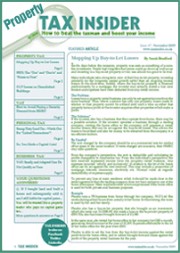Before you go, sign up to our free tax saving email course. Get 7 top property tax saving strategies in your email inbox that will help you save thousands in tax. Unsubscribe any time.
 Just because you are no longer receiving rental income does not necessarily mean you have ceased to have a property letting business. This article looks at when it will be possible to treat the business as continuing even though there is a period of no rental income. Just because you are no longer receiving rental income does not necessarily mean you have ceased to have a property letting business. This article looks at when it will be possible to treat the business as continuing even though there is a period of no rental income.This can be important, particularly if you have been making  losses in the business. All lettings in the UK by the same person (except furnished holiday accommodation, which is dealt with separately) are treated as one business, so a loss on one property let can be set against a profit on another property let in the same year, and losses brought forward from a previous year can be set against profits from a different property in a later year, even if the loss making property is no longer owned. losses in the business. All lettings in the UK by the same person (except furnished holiday accommodation, which is dealt with separately) are treated as one business, so a loss on one property let can be set against a profit on another property let in the same year, and losses brought forward from a previous year can be set against profits from a different property in a later year, even if the loss making property is no longer owned.This only applies for as long as the business continues. If it ceases, any unused losses are – lost. They cannot be used against other forms of income, so with no property letting business, they cease to exist. You may have a break in your letting business for any number of reasons – for example, you might be refurbishing the property, or you might simply be having difficulty finding a suitable tenant. Normally the cessation problem will only arise in the case of a landlord with only one or two properties, because owners of multiple properties are unlikely to have all of them out of action for refurbishment or otherwise untenanted at the same time. You may even sell your only buy to let property. This does not necessarily mean you have ceased to run a property letting business. If you buy another property and start letting it, then can you argue that this is the same letting business you were carrying on before you sold the first property? This depends on several factors, and the first is how long the gap between the two lettings is. HMRC’s property income manual states (at www.hmrc.gov.uk/manuals/pimmanual/PIM2510.htm ) that they will not normally argue that there was a cessation of the letting business (and thus an end to carrying forward its losses) provided the gap between the two lettings is no longer than three years. It is not quite as simple as this, however. If you invest the proceeds of the sale of the first property in a different business venture, or in something long-term such as EIS shares (which must be held for at least three years) then HMRC are likely to argue that the letting business has ceased even if you start again within three years. If on the other hand you invest in more liquid assets such as bank deposits or (if you are very brave!) the stock market, then this will indicate that you want the money handy in case another property comes up that you can buy and let. Another factor HMRC will consider is the type of lettings you have. For example, if you sell a residential property and then two years and ten months later you buy a commercial property, they may well argue that this is a different type of letting business and the old one has ceased. One thing to be particularly careful about, if you only have one letting property, is if you go and live in it yourself. Unless you have (or can show you are actively trying to acquire) another letting property, HMRC will again treat this as an indication that your letting business has ceased. The three year period is only an indication – HMRC will accept, if you can provide “convincing evidence” you were trying to continue, that a longer gap does not necessarily mean a cessation. Practical Tip : If you have losses carried forward in your rental business, do not assume they are no longer available just because there has been a break in your letting business. As long as you can show you intended to continue, and when you do, you are in the same sort of letting sector within three years, HMRC should accept that you have not ceased your letting business. This is a sample article from the monthly Property Tax Insider magazine. Go here to get your first free issue of Property Tax Insider.
|


 Tax Articles
Tax Articles